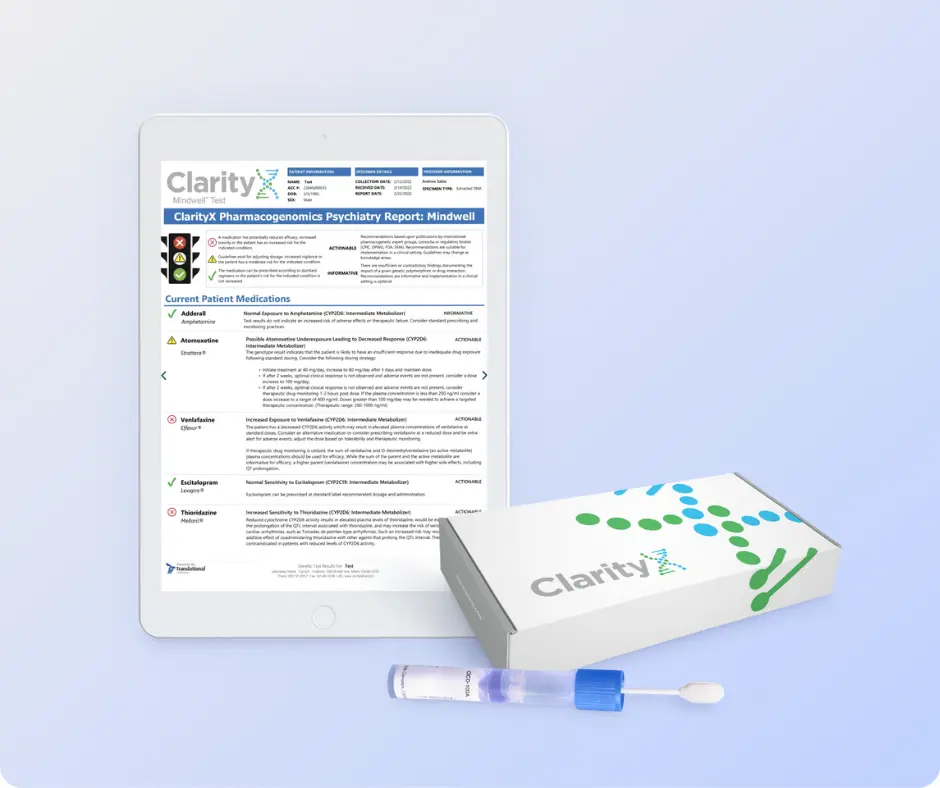In this article, we’ll compare two major medications (Prozac vs. Wellbutrin) and demonstrate how a DNA test can help you choose between them.
Mental wellness is a growing issue in the United States. Ever since the COVID-19 pandemic, more and more adults have reported experiencing depression, anxiety or a combination of both. Here are a few statistics that highlight how many Americans go through mental health issues:
- Depression: Over 16 million adults
- Generalized anxiety: Over 6 million adults
- Panic disorder: Over 6 million adults
- Obsessive-compulsive disorder (OCD): Over 2 million adults
People with these mental health disorders often struggle with chronic stress, sadness, and — in severe cases — suicidal thoughts. While these statistics may seem bleak, there is a silver lining: treatment is available. Most doctors recommend a combination of therapy and antidepressants. In this article, we’ll review two frequently prescribed antidepressants: Prozac and Wellbutrin. By comparing these antidepressant medications, we’ll help you figure out which is the best choice for your needs.
Prozac vs. Wellbutrin: What Are They?
Prozac and Wellbutrin are antidepressant medications that are most commonly prescribed to treat major depressive disorder. Let’s delve into the drug information for each treatment option.
What Is Prozac?
Prozac (a branded version of fluoxetine) is part of a class of drugs called selective serotonin reuptake inhibitors (SSRIs). These drugs work by increasing levels of serotonin, a neurotransmitter that affects the following:
- Emotions
- Appetite
- Sleep
Over time, Prozac can help relieve common symptoms of depression (such as poor mood, loss of appetite, and trouble sleeping). It’s also used to treat anxiety. Currently, Prozac is only FDA-approved for OCD and panic disorders; however, many healthcare providers prescribe it off-label for generalized anxiety.
What Is Wellbutrin?
Wellbutrin (a branded version of bupropion) belongs to a class of antidepressants called norepinephrine/dopamine reuptake inhibitors (NDRIs). They work by boosting levels of norepinephrine and dopamine, which may influence the following:
- Mood
- Concentration
- Satisfaction levels
Usually, Wellbutrin is prescribed to treat depression (including both major depressive and seasonal affective disorder). In some cases, it may be prescribed off-label for patients with ADHD or people who are trying to quit smoking.
Can I Take Prozac and Wellbutrin Together?
If you have both depression and anxiety, taking Prozac and Wellbutrin together may help — there are instances where doctors have prescribed both bupropion and fluoxetine to combat negative symptoms. However, there are also risks involved. Taking both these drugs simultaneously increases the possibility of seizures (which are rare when the drugs are taken alone). This risk is especially high if you meet any of these criteria:
- You’re an older adult (65+)
- You’re experiencing alcohol or drug withdrawal
- You have a brain tumor or head trauma
- You’ve had seizures before
The best way to determine whether Prozac and Wellbutrin will be safe together is by talking to your doctor. If they determine that this combination is too risky, you can work together to devise alternate treatment plans.
Prozac vs. Wellbutrin: Dosage Amounts
Whether you’re taking Prozac or Wellbutrin, you can expect your doctor to customize your dosage amount. Dosages can vary depending on these factors:
- Age
- Weight
- Medical history
- Condition being treated
Someone who has multiple health conditions and takes a variety of medications can expect to have a lower dosage than someone who is solely being treated for depression. Ultimately, your dosage can help lower the risk of adverse effects and increase the effectiveness of the medication. Let’s take a closer look at how both Prozac and Wellbutrin are usually prescribed.
Prozac Dosages
Prozac is available in the following forms:
- Tablet
- Delayed-release tablet
- Oral solution
Before prescribing the drug, your healthcare provider will consider your precise needs. For example, if you tend to experience side effects when taking fast-acting drugs, they may recommend the delayed-release tablet. They’ll also take into account the condition that’s being treated — patients with the panic disorder generally have lower dosages than those with depression or OCD. Ultimately, there’s no universal experience when it comes to Prozac. In the chart below, you’ll find details describing the general expectations for a depression patient taking this drug.
| Starting Dose | Maximum Allowed Dose | Time for Drug to Absorb in Bloodstream | Time for Drug to Become Effective |
| 20 mg/day | 80 mg/day | 4 to 8 hours | 4 to 6 weeks |
Wellbutrin Dosages
When prescribing Wellbutrin, your healthcare provider will choose between one of the following options:
- Immediate release
- Sustained release (SR)
- Extended-release (XL) The immediate release version will act quickest but have relatively short-lasting effects. The extended-release version, on the other hand, will take the longest to activate and will remain effective for longer periods of time. Although the selected type varies from person to person, most people are prescribed the extended-release version. Every person who takes this drug has a different experience with it. The chart below outlines the general guidelines and functionality of Wellbutrin XL.
| Starting Dose | Maximum Allowed Dose | Time for Drug to Absorb in Bloodstream | Time for Drug to Become Effective |
| 150 mg/day | 450 mg/day | 33 to 37 hours | 6 to 8 weeks |
Prozac vs. Wellbutrin: Side Effects
Starting an antidepressant is the first step toward better mental health. Unfortunately, you may have to experience a few side effects before you can reach that point. Here is a chart that examines the side effect profiles of these drugs:
| Prozac | Wellbutrin | |
| Nausea | Yes | Yes |
| Dry mouth | Yes | Yes |
| Indigestion | Yes | Yes |
| Sweating | Yes | Yes |
| Drowsiness | Yes | Yes |
| Insomnia | Yes | Yes |
| Rashes | Yes | Yes |
| Shaking | Yes | Yes |
| Muscle pain | No | Yes |
| Sexual side effects | Yes | No |
Overall, Prozac and Wellbutrin have a big overlap in terms of symptoms. While doctors cannot 100% guarantee that you won’t experience a certain symptom, there are a few factors that may indicate a drug is not safe for you.
Who Should Not Take Prozac?
You should not take Prozac (fluoxetine) if you meet any of the following conditions:
- You are under eight years of age
- You’ve taken a MAO inhibitor in the past two weeks
- You have a history of drug abuse or suicidal thoughts
- You’ve experienced seizures or epilepsy
- You have symptoms that may be worsened by Prozac (such as sexual problems)
Having an open conversation with your doctor about your medical history can go a long way in preventing unwanted symptoms.
Who Should Not Take Wellbutrin?
The safety of bupropion (or Wellbutrin) may be compromised if you meet these conditions:
- You are under 18 years old
- You drink alcohol frequently
- You have a history of heart disease or high blood pressure
- You’ve experienced seizures or head injuries
- You have symptoms that may be worsened by Wellbutrin (such as muscle or joint pain)
While these factors indicate that Wellbutrin is not right for you, exceptions may be made — for example, doctors have prescribed low levels of Wellbutrin to children. Ultimately, you should talk to your healthcare provider to learn more.
Prozac vs. Wellbutrin: Which One Should I Take?
So, you’ve read about the different functions, dosage amounts, and side effects of Prozac and Wellbutrin. The next step is to decide which one is better for you. In some cases, it may be obvious. For example, if you have OCD or panic disorders, you can immediately rule out Wellbutrin (which isn’t used for anxiety). However, in other cases (such as in depression patients), there’s no clear-cut answer.
If you’re a candidate for both drugs, your doctor will probably pick one, estimate a dosage, and see what happens. While the doctor will do their best to make an educated decision, there’s no guarantee it’s the right one. Fortunately, you can change that through a DNA test.
What Is DNA Testing?
There’s no universal response when it comes to medication. Every person has their own unique reaction — while one individual may metabolize a drug normally, others may break it down at above or below average rates. Generally, a small increase or decrease in metabolism isn’t a huge deal. However, if you metabolize very slowly or quickly, it can impact the overall effectiveness of a medication.
When you metabolize rapidly, you’re breaking down a drug before it even has the chance to work. On the other hand, if you metabolize too slowly, the drug is left in your system for too long (which causes adverse effects). Either way, you don’t want to take a medication that does more harm than good.
DNA testing (or pharmacogenetic testing) helps narrow down potential medications by evaluating your metabolism function. It focuses on an enzyme called cytochrome P450, which breaks down the majority of clinically used drugs. Through a DNA test, you’ll discover the exact medications (and dosage amounts) that work well with your body.
Where Can I Get a Pharmacogenetics Test?
Now that you know the benefits of pharmacogenetic testing, you might be wondering: where can I get a test for myself? ClarityX offers clinical grade high-quality, effective pharmacogenetics tests that can be conducted from the comfort of your own home. Here’s a closer look at the available options.
Mindwell Test
As you can probably guess by the name, the Mindwell Test is designed for medications that treat mental health conditions, such as the following:
- Clinical Depression
- Anxiety Disorder
- Bipolar Disorder
- ADHD / ADD
- OCD
- PTSD
If you want to find the best depression, anxiety, or ADHD treatment, the Mindwell test covers over 130 mental health prescription medications. It covers several well-known brands, including Prozac and Wellbutrin.
Max Rx Test
The Max Rx test is ClarityX’s most comprehensive option. It includes everything found in the Mindwell Test, along with 21 additional therapeutic areas:
- Pain management
- Psychiatry
- Cardiology
- Endocrinology
- Gastroenterology
- Gynecology
- Immunology
- Infectious Disease
- Neurology
- Oncology
- Ophthalmology
- Otolaryngology
- Pulmonology
- Rheumatology
- Urology
- Steroids
Get a ClarityX Test Today!
Are you trying to choose between Prozac and Wellbutrin? If so, you can’t go wrong with the Mindwell or Max Rx Test. Both options will give you a thorough report that can be shared with your doctor and used to fuel better healthcare decisions for the future. To get a test, complete the following steps:
- Request your desired test
- Complete the check-out process
- Activate your test kit online
- Wait for your kit, then perform a cheek swab sample
- Send your test back using the pre-paid envelope
- Receive your results!
Once completed, you’ll receive a personalized report in your ClarityX patient portal. Start today and start making happier, healthier medication decisions!





